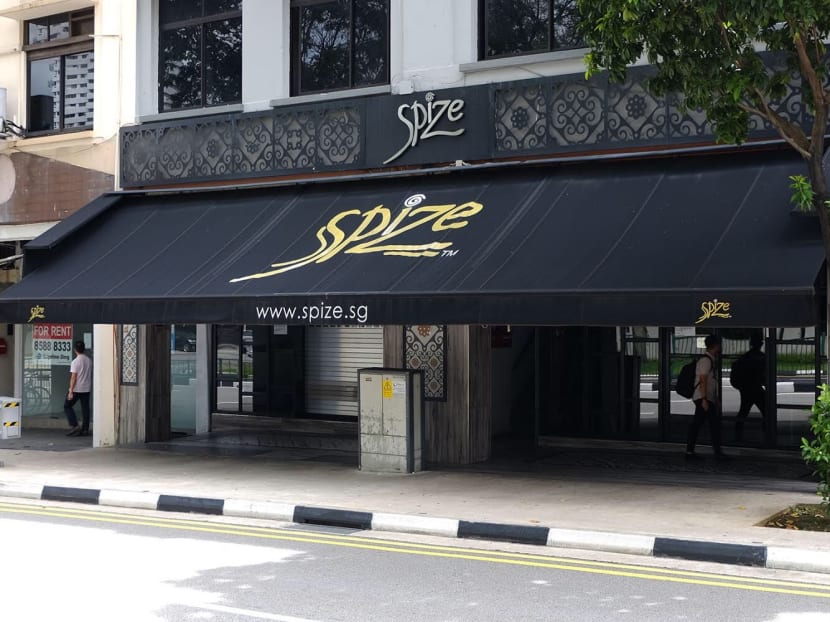Legal action to be taken over ‘egregious’ lapses found in Spize’s River Valley branch
SINGAPORE — The National Environment Agency (NEA) on Friday (Dec 7) slammed the food hygiene lapses found at popular eatery Spize as “unbecoming”, as it terminated the licence of its River Valley outlet.

The National Environment Agency, Ministry of Health and Agri-Food and Veterinary Authority of Singapore said in a joint statement on Friday that there was “strong evidence” of severe contamination from poor hygiene and food handling practices at Spize's outlet at River Valley.
SINGAPORE — The National Environment Agency (NEA) on Friday (Dec 7) slammed the food hygiene lapses found at popular eatery Spize as “unbecoming”, as it terminated the licence of its River Valley outlet.
NEA’s director-general for environmental public health Derek Ho told reporters at a press conference that the authorities were “very angry... very upset with the way things are being done right now”.
“It is really unbecoming that our operators are not taking this seriously,” he added, stressing that the authorities took a very “tough stance” on the matter.
Spize’s River Valley outlet will be shut down following investigations which revealed an “unusually severe” outbreak of gastroenteritis from “heavily contaminated” food.
The NEA, Ministry of Health (MOH) and Agri-Food and Veterinary Authority of Singapore (AVA) said in a joint statement on Friday that there was strong evidence of severe contamination from poor hygiene and food handling practices.
The incident left 47 people hospitalised and one person dead. In total, 82 cases of food poisoning were reported by people who had consumed food from the restaurant on seven occasions between Nov 6 and 9.
Spize River Valley first had its licence suspended on Nov 7, after the NEA, MOH and AVA were first alerted to the cases.
The licence termination, which takes effect immediately, will only affect its River Valley outlet. Spize’s other outlets at Rifle Range Road, Bedok and Siglap will still be allowed to operate, as there was no evidence that the incident at River Valley was linked to other locations.
Apart from the termination of its River Valley outlet licence, the authorities will also be taking enforcement action for its “egregious” lapses.
Mr Ho told reporters on Friday that the owners of Spize will be taken to court. No further details were given, but Mr Ho told reporters that the authorities will apply “the appropriate weight of the law”.
Lawyers TODAY contacted said Spize’s owners could face charges for offences under the Environmental Public Health Act, as well as the Sale of Food Act.
The penalties for food establishment offences under the Environmental Public Health Act is a maximum fine of either S$5,000 or S$10,000 for first-time offenders. Repeat offenders will face a jail term. Similar punishments are prescribed under the Sale of Food Act.
The NEA, which conducted 88,000 inspections last year, said its past inspections of Spize’s River Valley outlet showed no major hygiene lapses. It last inspected the outlet in October.
TODAY has reached out to Spize for its comments. Spize River Valley’s Facebook page was removed from the social networking site on Friday afternoon.
In 2010, a Geylang rojak seller was barred and fined S$9,000 on three charges – selling food unfit for consumption, and two charges of failing to ensure that the chopping board and refrigerator tray used in connection with the sale of food were kept clean. The food poisoning incident led to two deaths and 154 other customers falling ill.
JOINT INSPECTIONS REVEALED ‘SEVERE’ LAPSES
The agencies conducted joint investigations on two occasions, first on Nov 7 after being notified of the cases, and a week later on Nov 14.
Among the food hygiene lapses across both inspections they found were:
Not providing soap for hand-washing
Food prepared outside the licensed kitchen area
Poor personal hygiene and food preparation practices of the food handlers
What the agencies flagged from the Nov 14 investigations:
Dried salted fish, chicken floss and fish crackers were supposed to be discarded after its licence was suspended, but that was not done
Eggs that were meant to be discarded were dispatched to another Spize outlet for use
What laboratory investigations revealed:
Salmonella Typhimurium, a commonly-occurring bacterium, was found in some of the affected cases, raw and ready-to-eat food, as well as from environmental samples in the premises
In food samples, Salmonella Typhimurium, along with other food-borne pathogens and faecal bacteria, was found in belacan egg fried rice
Salmonella Typhimurium was found in raw chicken samples and kang kong
Faecal bacteria were also detected on a chopping board and knife used for ready-to-eat food
Given that the Salmonella Typhimurium bacteria were found closely related to each other by genetic analysis, this meant that they probably came from the same source, the agencies said on Friday.
RECENT SPATE OF FOOD POISONING CASES
In the wake of the Spize River Valley incident, Singapore was hit by another three food poisoning cases.
On Nov 23, 190 people fell ill after eating food prepared by TungLok Catering for the Singapore Civil Defence Force’s public exhibition at the Singapore Expo
On Nov 27, 131 people — including kindergarten students and teachers — were hit by gastroenteritis after consuming food prepared by FoodTalks Caterer and Manufacturer located at Shimei East Kitchen along Bedok North Street 5
High-end hotel Mandarin Orchard Singapore suspended operations at its Grand Ballroom on Wednesday (Dec 5) after 175 people developed symptoms such as diarrhoea and vomiting, and nine were hospitalised
The authorities declined to comment on the other three cases, but would only say that investigations are still ongoing.









